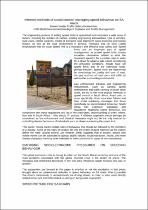JavaScript is disabled for your browser. Some features of this site may not work without it.
- ResearchSpace
- →
- Research Publications/Outputs
- →
- Journal Articles
- →
- View Item
| dc.contributor.author |
Venter, Karien

|
|
| dc.date.accessioned | 2010-01-11T07:07:52Z | |
| dc.date.available | 2010-01-11T07:07:52Z | |
| dc.date.issued | 2009-09 | |
| dc.identifier.citation | Venter, K. 2009. Informal methods of social control: managing speed behaviour on SA roads. Civil Engineering, Vol. 17(8), pp 30-35 | en |
| dc.identifier.uri | http://hdl.handle.net/10204/3864 | |
| dc.description | Copyright: 2009 South African Institution of Civil Engineering (SAICE) | en |
| dc.description.abstract | The engineering process of setting speed limits is specialised and considers a wide array of factors, including the number of crashes, existing engineering interventions, types of vehicle, road users, vehicle volumes, modes of transport, road alignment, socio-economic and human factors, as well as the road environment in general. Fieldwick and De Beer (1988) emphasised that an urban speed limit is a necessary and effective road safety tool. Speed limits convey important information to drivers as to what the safe maximum speed is for a certain road considering the prevailing conditions. Roads have prescribed speed limits that fit the individual road's primary function. These limits are determined by considering the quality and type of road, the type and mix of road users and traffic, and the surrounding environment. | en |
| dc.language.iso | en | en |
| dc.publisher | South African Institution of Civil Engineering (SAICE) | en |
| dc.subject | Speed | en |
| dc.subject | Social control | en |
| dc.subject | South African roads | en |
| dc.subject | Speed limit | en |
| dc.subject | Vehicle volumes | en |
| dc.subject | Road users | en |
| dc.title | Informal methods of social control: managing speed behaviour on SA roads | en |
| dc.type | Article | en |
| dc.identifier.apacitation | Venter, K. (2009). Informal methods of social control: managing speed behaviour on SA roads. http://hdl.handle.net/10204/3864 | en_ZA |
| dc.identifier.chicagocitation | Venter, Karien "Informal methods of social control: managing speed behaviour on SA roads." (2009) http://hdl.handle.net/10204/3864 | en_ZA |
| dc.identifier.vancouvercitation | Venter K. Informal methods of social control: managing speed behaviour on SA roads. 2009; http://hdl.handle.net/10204/3864. | en_ZA |
| dc.identifier.ris | TY - Article AU - Venter, Karien AB - The engineering process of setting speed limits is specialised and considers a wide array of factors, including the number of crashes, existing engineering interventions, types of vehicle, road users, vehicle volumes, modes of transport, road alignment, socio-economic and human factors, as well as the road environment in general. Fieldwick and De Beer (1988) emphasised that an urban speed limit is a necessary and effective road safety tool. Speed limits convey important information to drivers as to what the safe maximum speed is for a certain road considering the prevailing conditions. Roads have prescribed speed limits that fit the individual road's primary function. These limits are determined by considering the quality and type of road, the type and mix of road users and traffic, and the surrounding environment. DA - 2009-09 DB - ResearchSpace DP - CSIR KW - Speed KW - Social control KW - South African roads KW - Speed limit KW - Vehicle volumes KW - Road users LK - https://researchspace.csir.co.za PY - 2009 T1 - Informal methods of social control: managing speed behaviour on SA roads TI - Informal methods of social control: managing speed behaviour on SA roads UR - http://hdl.handle.net/10204/3864 ER - | en_ZA |






